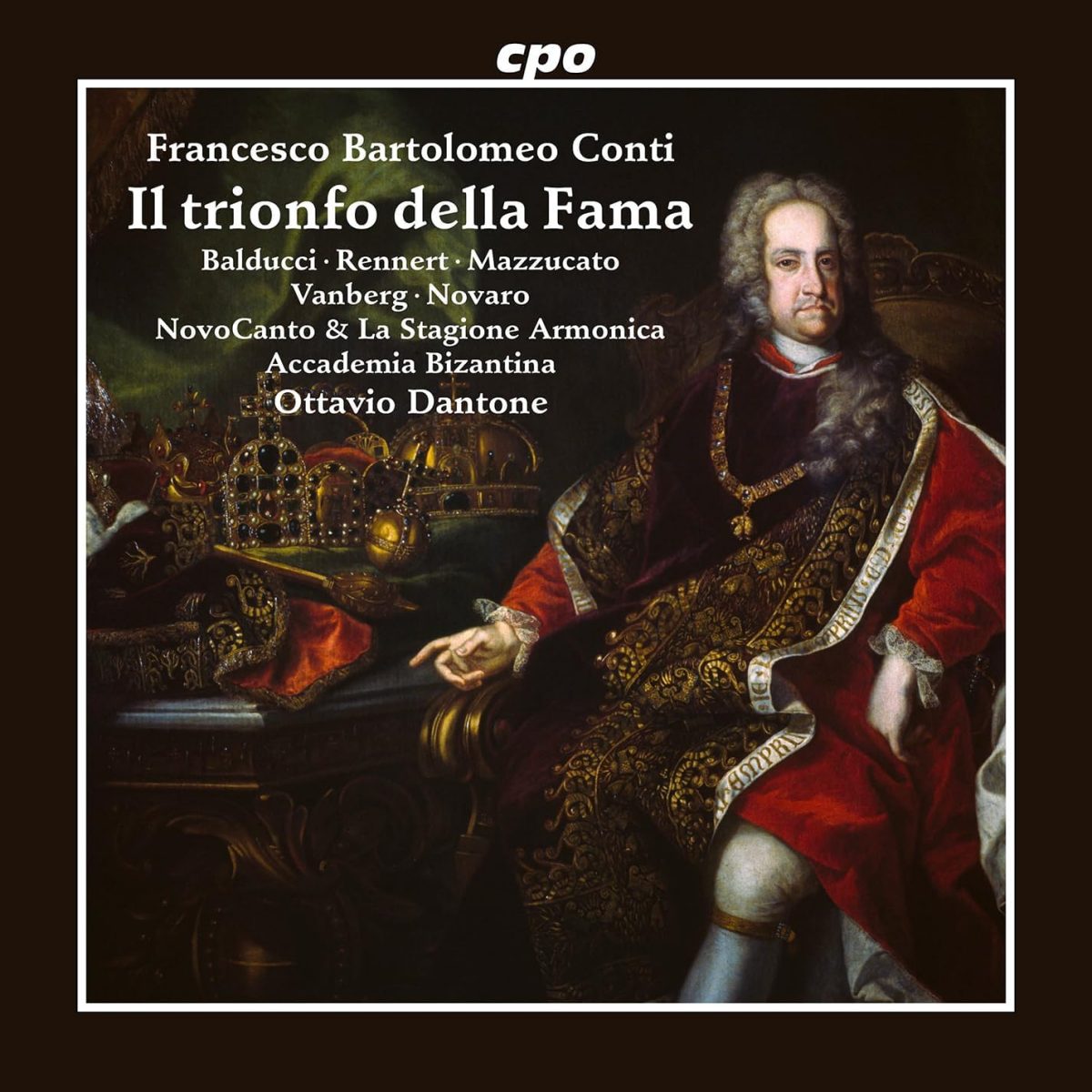NovoCanto & La Stagione Armonica, Accademia Bizantina, directed by Ottavio Dantone
81:46 (2 CDs)
cpo 555725-2
Il trionfo della fama is one of three serenatas commissioned by the Habsburg empress Elisabeth Christina from Florentine-born Francesco Bartolomeo Conti (1682-1732) in honour of either the birthday or name day of her husband Charles VI. Conti, who served the Viennese court from 1701 until his death in 1732, was initially hired as associate theorbist, in 1708 becoming principal court theorbist. Today Conti is principally remembered as a composer of operas that came to dominate the Viennese Carnival season, the principal period in Vienna for the production of secular dramatic works at a court particularly devoted to sacred music.
Il trionfo was in fact not given in Vienna, but rather Prague on 4 November 1723, the name day of Charles. Cast in a single act, the serenata, typically for the genre, eschews dramatic development in favour of a panegyric text put into the mouths of a group of allegorical characters, here Fama (alto), Gloria (mezzo), Genio (alto), Destino (tenor) and Valore (bass). There is no ‘plot’, the ‘characters’ discourse simply revolving around the reiteration of the monarch’s qualities and achievements voiced in the customary alternation of recitative and aria. There is also a single duet, while the work opens and closes with grandiose double choruses that include trumpets and timpani. The work concludes with a licenza, a scenic representation illustrating the glory of the subject. In keeping with the lavish musical establishment maintained by the Viennese court, a total of 73 musicians in the Hofkapelle in 1721, the work is richly scored, to the point, for example, of ‘L’Asia crolla’, an aria for Valore (Valour) that includes a demanding concertante role for two bassoons. The arias, too, are invariably bravura pieces with extensive melismatic passages combining with the kind of rhetorical writing the verse of this kind of eulogy demands, ‘Asia crumbles, Africa fears this Emperor’s great valour’, and so forth. The singers who first performed Il trionfo were regular court singers and included the celebrated male alto Gaetano Orsini (Fama), who graced the Viennese musical scene over a period of nearly forty years. Conti’s writing is at times highly individual, as is apparent from quirkily fragmented passages in his three-part overture, but at other times there tends to be a reliance on sequential writing that can become predictable.
The present performance stems from the 2024 Innsbruck Early Music Festival. Full of vibrant life, it is typical of the kind of intensity and restlessness associated with the Innsbruck Festival’s new music director. At times, this can work to the disadvantage of the soloists, an aria like Valore’s declamatory ‘Io che regno’, with its wide range and multiple passaggi not made more comfortable for the fine bass Riccardo Novaro by Dantone’s arguably over-agitated direction. But in general terms, Dantone’s is a perceptive performance that reveals Il trionfo as a fascinating example of the occasional serenata. The palm for the best singing goes to Sophie Rennert’s Gloria. She gives a particularly fine account of the character’s second aria, ‘Spira il ciel’, one of the few to include any significant cantabile element. Here, the long winding sequential accompaniments support her evenly produced mezzo and fine mezza voce to provide a pleasing contrast to the prevailing bravura writing, largely coped with by the cast in as accomplished a manner as can be expected today, though diction is at times not exemplary.
It is pleasing to report that, in contrast to a number of recent cpo releases, the booklet does include the Italian text and an English translation.
Brian Robins
